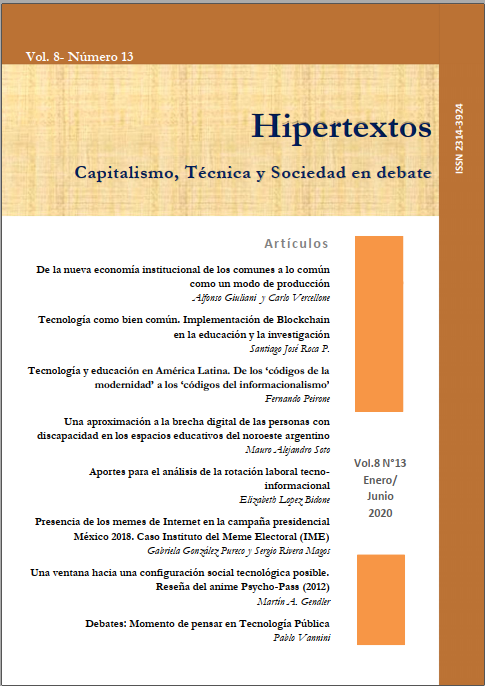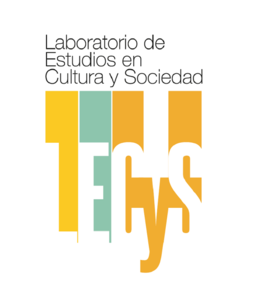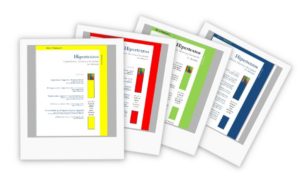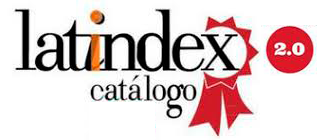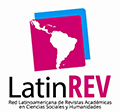De la Nueva Economía Institucional de los Comunes a lo Común como un Modo de Producción
DOI:
https://doi.org/10.24215/23143924e009Palabras clave:
comunes, común en singular, modo de producción, economía política de los comunes, capitalismo cognitivoResumen
El objetivo de este artículo es describir el origen, el significado y las cuestiones que están en juego en el debate que se ha desarrollado alrededor de la reciente área de investigación sobre los comunes y reformular la noción de lo común en un contexto post-socialista de superación del capitalismo. Consideraremos, en primer lugar, las contribuciones y limitaciones del enfoque de Ostrom, el cual ha conducido a una cantidad de investigadores a formular planteos alternativos. En segundo lugar, presentamos las teorías de lo común en singular. Luego de un análisis crítico de los aspectos más salientes de la teoría política y normativa de Dardot y Laval (2014), pondremos la atención en la idea neo-operaísta de lo común como un modo de producción. Presentamos el marco teórico y conceptual de esta idea para mostrar cómo lo común constituye un sistema socio-económico que se deriva de las contradicciones internas del capitalismo cognitivo y ofrece una alternativa global a una representación de la sociedad y la economía que se basa en la diarquía Estado-Mercado.
Descargas
Citas
Bettelheim, Ch. (1970). Problèmes Théoriques et Pratiques de la Planification (Theoretical and Practical Problems of Planning). Paris: Maspero.
Bauwens, M. (2016). Sauver le monde (Save the World -Toward a Post Capitalist Society with P2P). Paris: Les liens qui libèrent.
Benkler, Y. (2004). Common Based Strategies and the Problem of the Patents. Science, 305 (5687): 1110-11
Boyle, J. (2003). The Second Enclosure Movement and the Construction of the Public Domain. Law and Contemporary Problems, 66: 34-74.
Coriat, B. (2015) (ed.) Le Retour des Communs. La crise de l'idéologie propriétaire (The Return of Commons. The crisis of the proprietary ideology). Paris: Les Liens qui Libèrent.
Coutrot, Th. (2018). Libérer le travail (To Free Work). Paris: Seuil.
Dardot, P. and Laval, Ch. (2014). Common. On Revolution in the 21st Century. Translated by Matthew MacLellan. London: Bloomsbury.
David, P. A . and Foray, D. (2002). Une introduction à I'économie et à la société du savoir (An lntroduction to the Economy and Knowledge-Based Society). Revue internationale des sciences sociales, 171: 13- 28.
Comissione Rodotà (2007). Commissione Rodotà -per la modifica delle norme del codice civile in materia di beni pubblici (14 giugno 2007)-Proposta di articolato (Propasal for an amendment of the norms of thc civil code on matters of public goods). https://www.giustizia.it/giustizia/it/mg_1_12_1.wp?contentId=SPS47617.
Gambetta, D. (1992). La Mafia Siciliana. Un 'Industria della Protezione Privata (Sicilian Mafia: a Private Security lndustry). Torino: Einaudi.
Gorz, A. (1977). The Division of Labour: The Labour Process and Class Struggle in Modern Capitalism. Hassocks: Harvester Press.
Gorz, A. (2008). Ecology as politics. Translated by Patsy Vidgerman and Jonathan Cloud. Montréal: Black Rose Books Ltd.
Hardin, G. (1968). The Tragedy of the Commons. Science, 62 (3859): I243-48.
Hardt, M. and Negri, A. (2009). Commonwealth. Cambridge, MA: Harvard University Press.
Hess, Ch. and Ostrom, E. (2007) (eds.). Understanding Knowledge as a Commons: From Theory to Practice. Cambridge, MA: MIT Press.
Laloux, F. (2015). Reinventing Organizations: Vers des communautés de travail inspires (Reinventing Organizations: Towards Inspired Work Communities). Diateino: Paris.
Lomazzi, L. (2018). Approches critiques de la captation et de l'exploitation des donnés numérique. Vers une politique du commun? (Critical Approaches to Capturing and Exploiting Digital Data: Toward a Politics of the Common?). In Big Data and Society: Industrialization of Symbolic Mediations. Edited by André Mandoux and Mare Ménard, 211-32. Québec: Presses de I'université du Québec.
Lomazzi, L. and Ménard, M. (2018). Où en est la théorie du/des commun(s)? Vers une économie politique culturelle (Where is the theory of the common(s)? Toward a Cultural Political Economy) tic&société 12(1): 69-93. 10-40oo/tic&societe.2381
Loveluck, B. (2015). Internet, une société contre l'Etat? Libéralisme informationnel et économies politiques de l’auto-organisation en régime numérique (Internet, a Society against the State? Informational Liberalism and Political Economies of Digital Self-organization). Réseaux, 4 (192): 235-70. 10.3917/res.192.0235
Marx, K. [1875] (2009). Critique of the Gotha Programme. Gloucester, UK: Dado Press.
Mattei, U. (2012) Beni comuni. Un Manifesto (Common Goods: A Manifesto). Laterza: Roma·Bari.
Monnier, J-M. and Vercellone, C. (2014). The Foundations and Funding of Basic Social Income as Primary Income. A Methodological Approach. Basic Income Studies, 9 (2): 59-77.
Negri, A. (2016). Il commune come modo di produzione (The Common as a Mode of Production). Euronomade, March 27. www.euronomade.info/?p=7331
Negri, A. (2014). La metafisica del comune (The Metaphysics of the Common). Il Manifesto, May 6. https://ilmanifesto.it/la-metafisica-del-comune/
Ostrom, E. (1990). Governing the Commons. The Evolution of Institution for Collective Action. Cambridge: Cambridge University Press.
Ostrom, E. and Hess, CH. (2010) Private and Common Property Rights. In Encyclopedia of Law and Eeonomics. Edited by Boudewijn Bouckaert, 53-106. Northampton, MA: Edward Elgar.
Rifkin, J. (2014). The Zero Marginal Cost Society: Internet of Things, the Collaborative Commons, and the Eclipse of Capitalism. New York: Palgrave Macmillan.
Robertson, B. J. (2015). Holacracy: The New Management System for a Rapidly Changing World. New York: Henry Holt and Company.
Sauvêtre, P. (2016). Quelle politique du commun? (Which politics of the common?). SociologieS. October 19: 1-13. https://journals.openedition.org/sociologies/5674
Schlager, E. and Ostrom, E. (1992). Property-Rights Regimes and Natural Resources: A Conceptual Analysis. Land Economics, 68 (3): 249- 62.
Vercellone, C. et al. (2015) Managing the Commons in the Knowledge Economy: Decentralized Citizens Engagement Technologies. Report D3.2, D-CENT. https://dcentproject.eu/wp-content/uploads/2015/07/D3.2-complete-ENG-v2.pdf
Vercellone, C., Brancaccio, F., Giuliani, A. and Vattimo, P. (2017). Il Comune come Modo di Produzione. Per una critica dell'economia política dei beni comuni. (The Common as a Mode of Production. Towards a Critique of the Political Economy of Common Goods). Verona: Ombre Corte.
Vibert, S. (2016). L'institution de la communauté (The Institution of the Community). SociologieS. October 19. https://journals.openedition.org/sociologies/5683#quotation.
Weinstein, O. (2013). Comment se construisent les communs: questions à partir d’Ostrom (How the commons are built: Cuestions from Ostrom). In Le retour des communs: la crise de l'idéologie propriétaire, edited by Benjamin Coriat. 69-86. Paris: Editions les Liens qui libèrent.

